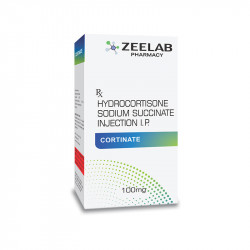Hydrocortisone
Hydrocortisone is a synthetic corticosteroid used to treat a variety of conditions, primarily related to inflammation and immune system disorders. It is commonly prescribed for its anti-inflammatory and immunosuppressive properties. Hydrocortisone can be administered in several forms, including oral, topical, and injectable. It helps reduce inflammation, alleviate pain, and manage immune responses in conditions such as arthritis, eczema, and other skin disorders. It is an essential treatment option for patients with inflammatory conditions.
Uses of Hydrocortisone
- Treats inflammation and swelling caused by arthritis.
- Relieves symptoms of eczema and other skin conditions.
- Used to manage allergic reactions and skin irritations.
- Helps in the treatment of adrenal insufficiency (Addison’s disease).
- Reduces inflammation in conditions like asthma and Crohn’s disease.
How Hydrocortisone Works
Hydrocortisone works by mimicking the effects of cortisol, a natural hormone produced by the adrenal glands. It helps reduce inflammation, suppress the immune system, and regulate various processes in the body to treat conditions like arthritis, allergies, and autoimmune diseases. By reducing the immune response, it effectively controls symptoms of inflammation and swelling.
Benefits of Hydrocortisone
- Reduces inflammation and pain in various conditions.
- Helps treat skin conditions like eczema and dermatitis.
- Effective in managing autoimmune disorders by suppressing abnormal immune responses.
- Provides relief from severe allergic reactions and itching.
How to Take Hydrocortisone
Hydrocortisone can be taken orally, applied topically, or injected, depending on the condition being treated. For oral use, it is usually taken with food to avoid stomach irritation. Topical creams or ointments should be applied to the affected area as directed by your healthcare provider. Injectable forms are typically administered in a healthcare setting under the supervision of a doctor.
Type of Dosage Available
- Oral tablets
- Topical creams, ointments, and lotions
- Injectable forms
Side Effects of Hydrocortisone
- Common: Skin irritation, weight gain, and fluid retention.
- Severe: Mood swings, increased blood pressure, and muscle weakness.
- Long-term use can lead to osteoporosis, diabetes, and cataracts.
Safety Advice
- Avoid abrupt cessation of hydrocortisone, as it may cause withdrawal symptoms.
- Consult a doctor before use if you have a history of high blood pressure, diabetes, or infections.
- Monitor for signs of infection, as hydrocortisone can suppress the immune system.
- Use the lowest effective dose to minimize the risk of side effects.
Frequently Asked Questions (FAQs)
Q: How long does it take for Hydrocortisone to work?
A: The effects of hydrocortisone can vary depending on the condition being treated, but improvements are typically seen within a few days of starting the medication.
Q: Can Hydrocortisone be used for children?
A: Yes, hydrocortisone can be prescribed for children, but the dosage and duration of treatment will be carefully monitored by a healthcare provider.
Q: Is Hydrocortisone safe for long-term use?
A: Long-term use of hydrocortisone can lead to side effects like weakened bones or diabetes. It is recommended to use it at the lowest effective dose for the shortest duration possible.
Q: Can I stop using Hydrocortisone suddenly?
A: No, stopping hydrocortisone suddenly can cause withdrawal symptoms. It should be tapered off under the guidance of a healthcare provider.
Q: Can Hydrocortisone cause weight gain?
A: Yes, one of the common side effects of hydrocortisone is weight gain due to water retention and changes in metabolism.
Download India's most affordable pharmacy app
- Compare with medicine prices
- Save upto 90% on your medicine bills

Temperature Controlled storage and delivery

Regular Sanitization

Disinfected Packaging















 Added!
Added!